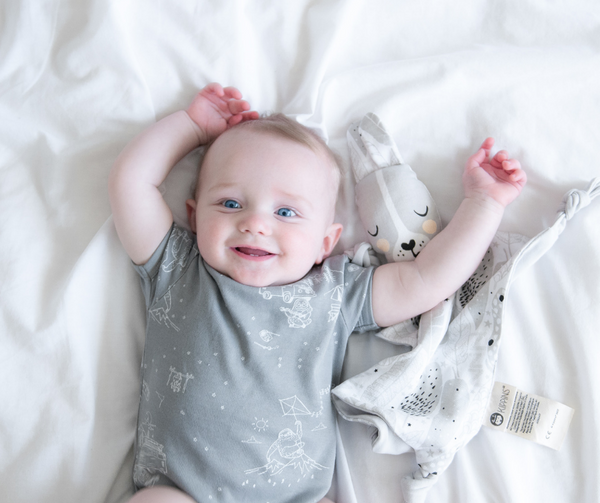The most asked questions about baby's sleep in the first year - answered!

Erika Lamour from The Sleep Dept has helped hundreds of Mums all over the world (including some famous ones!) get more sleep. Here, she answers all of the most asked questions she gets from Mums about baby sleep in the first year! Do not miss this!

The 4 month sleep regression
Ah yes... The dreaded 4 month sleep regression where sleeping patterns change and become more like an adults. Your baby's brain has matured, gone are the days where your little newborn could fall into a deep sleep at the drop of a hat. Now, they start to sleep more like us - they begin to go through light and deep sleep cycles. This means that each time your babies sleep cycle goes from deep to light, they will most likely wake up (that's every 45-60 minutes!)
While many parents fear the 4 month sleep regression, it really shouldn't be seen as a regression but more so a developmental milestone, and a time to implement a sleep program that's right for you and your baby.
Sleeping through the night
There are definitely foundations you can set early on to create great sleep habits, but the 0-3 month stage of your babies life really should be referred to as the 4th trimester. Babies are making a HUGE transition from womb to world - coming from an environment that is dark, warm and well nourished to suddenly being exposed to light, different temperatures and hunger. Whilst its not a great idea to have your newborn on a time-based schedule, if you make sure your newborn is awake for no longer than 45-60 minutes between sleeps, you are on your way to creating great habits.
Pacifiers/Dummies
Uh-oh! Paci's are great to settle and soothe newborns, but what happens when you are up 10 times in the middle of the night popping it back into your baby's mouth? The best thing to do is cut it - COLD TURKEY! I know it sounds scary! But if it is being used as a sleep association it WILL wake your baby in the middle of the night and when they can't find it, it may cause confusion and distress. We need to guide babies in having their own sleep associations that they create all themselves. Instead, replace the paci for a small comforter.
Sleep Associations
If your baby has a sleep association that means they will not fall asleep without this. The simple answer as to why this might be happening is - they haven't been allowed to figure it out on their own. When we introduce external sleeping associations, such as feeding or rocking a baby to sleep, we take that away from them. We don't want a baby to be falling asleep outside of their cot (easier said than done!). There are gentle ways that this can be done (The Sleep Dept. only uses gentle techniques and no Cry It Out methods). It takes patience and consistency, but the good news is that if we follow a plan 100%, the results are almost immediate, with babies falling asleep on their own and sleeping through by night 2!
Rolling and unswaddling
In my experience, the best way to get your baby out of the swaddle once they start rolling is to do this ... GO COLD TURKEY! It creates less confusion for your baby. I would recommend introducing a small handkerchief sized comforter, so that your baby can keep their hands busy if they need to. Again, most babies get used to having arms out in a night or two.
Teething
The MOST important thing to remember when your baby is sick, teething or going through a sleep regression is to not introduce anything new - especially a bad habit that you had worked so hard to get rid of in the first place! Of course, your baby needs you in times like these, and we encourage lots of cuddles when they are going through a tough time.They still need to know its night time and sleep will be the best thing for them if they are trying to recover from sickness. So do what you have to do - feed them, bring a mattress into their room, hug them. Just be sure to stay in their room. All of these things pass, and if a baby is on a solid routine, it will only be a few days before they are back on track.
Vacations
We get it. A long flight, lots of waiting around, unfamiliar surroundings - these can all affect your Bub. BUT if your little one is in a great routine at home, then they should be able to easily adjust wherever they are in the world. My best tips for travelling with a little one -
- Throw all your rules out when on the plane. It will be much less stressful for both you and Bub if you do what will easily calm your Bub.
- Get your baby onto a routine based on the timezone you are in. Babies adjust to different time zones much quicker than adults!
- Have your baby spend lots of time outside during the day, and start the nighttime wind down approx. 2-3 hours before sleep time.
-----------------------------------------
AND SHHHHH, an exclusive tip -
Best tip
The absolute best piece of advice I can share with you, that can be done as soon as your baby comes home is to have a solid bed time routine. Establishing a bedtime routine for your Bub is a must. Bub will be more relaxed if they know what's coming next. A short 20-30 minute routine for your baby right before bedtime is ideal and really makes for healthy sleep habits. Be sure to do the routine in your babies bedroom (after they are bathed and dressed). Most babies LOVE the bath, but if your baby doesn't find the bath relaxing, then switch it to the morning. The point of the bath during the bedtime routine is to calm your baby, not get them worked up right before bedtime. Our favourite routine goes a little something like this
BATH - PJ's - FEED/BURP - BOOK - CUDDLE - BLINDS DOWN - BED.

